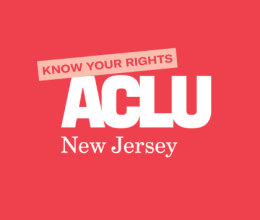
In a historic milestone for racial justice and civil rights, following years of campaigning from the ACLU of New Jersey and other advocacy and community partners, marijuana legalization and decriminalization are now officially law with Gov. Murphy’s signature. In implementing the historic ballot initiative legalizing cannabis, supported by voters largely for reasons of racial and social justice, the laws put in place some of the most ambitious, forward-looking cannabis laws in the country.
“With Governor Murphy’s signature, the decades-long practice of racist marijuana enforcement will begin to recede, in a shift that emphasizes the urgency of building the most equitable framework possible for cannabis legalization. Our state’s cannabis laws can set a new standard for what justice can look like, with the removal of criminal for possession and an unprecedented portion of revenue dedicated to addressing the harms wrought by the drug war,” said Amol Sinha, Executive Director of the American Civil Liberties Union of New Jersey, which is a founding member of New Jersey United for Marijuana Reform. “This is a new beginning – and the culmination of years of advocacy – and we must keep in mind that it is only the start. Signing these laws puts in motion the next phase of this effort: to work relentlessly to transform the principles of legalization into greater racial and social justice in New Jersey.”
The law dedicates historic funding levels toward community reinvestment: 100 percent of an excise fee on cultivators and 70 percent of sales tax toward social justice in communities that have borne the brunt of the unjust, racially discriminatory drug war. A groundbreaking decriminalization framework allows possession up to 6 ounces. And, in a historic move, youth possession and use of cannabis, as well as youth use and possession of alcohol, will follow a framework moving away from the severely punitive status quo, instead using an approach that emphasizes public health, harm reduction, and young people’s well-being.
“These historic reforms in cannabis laws shift the severely punitive status quo not only for adults, but for young people as well, with a new a framework to address youth possession that values public health, harm reduction, and the well-being of young people. We’re ready for the next phase of this long road toward justice, and our work begins now,” said ACLU-NJ Policy Director Sarah Fajardo. “We thank Gov. Murphy for signing these important laws, and we thank the champions of these laws: Senator Nicholas Scutari, Assemblywoman Annette Quijano, and Assemblyman Jamel Holley for legalization, and Senator Teresa Ruiz, Senator Rice, Senator Cunningham, and Assemblyman Benjie Wimberly for decriminalization – and all of the sponsors, lawmakers, and advocates who fought with passion to end prohibition through a racial justice lens. We extend particular thanks to the New Jersey Legislative Black Caucus and the Latino Caucus for leading key discussions to address racial and social equity concerns, specifically as they impact young New Jerseyans. We look forward to working with all of our elected officials, including the Legislature, Gov. Murphy, the Cannabis Regulatory Commission, and local leaders to secure even greater justice and move far beyond these harmful policies that have harmed communities of color for decades.”
The promise of cannabis legalization relies on further advocacy to push for further legislative progress, and to ensure that implementation truly begins to repair the harms of prohibition and creates an equitable and inclusive industry. The ACLU-NJ and partners will push for more racial and social justice provisions during the regulatory and budgeting processes and in future legislation.
The current cannabis laws impose a restrictive cap on the number of licenses, awarding only 37 cultivator licenses for the first 24 months after the bill is enacted, more than half of which have already been granted to medical cannabis licensees. The bill does not include several important justice measures, such as: restoring dedicated funding for expungement, limiting random workplace drug testing, and, crucially, closing a loophole that allows well-resourced businesses to claim and benefit from impact zone applicant status rather than residents. Advocates also vow to push for home-grow, which has implications for equity and racial justice.
The ACLU-NJ’s priorities once implementation and decriminalization go into law include:
- Securing robust community input regarding allocation of funds for community reinvestment
- Building equity into the industry through work with the Cannabis Regulatory Commission, including the prioritization of individuals from impact zones and those with prior cannabis-related records and their families in licensing
- Ensuring that people aren’t still subject to arrests and criminalization based on cannabis
- Making sure the expungement process is accessible, fair, and effective
- Putting safeguards in place to make sure that equity measures in the industry, such as impact-zone applicant status, truly allow those who have been impacted by the drug war to participate in meaningful ways

